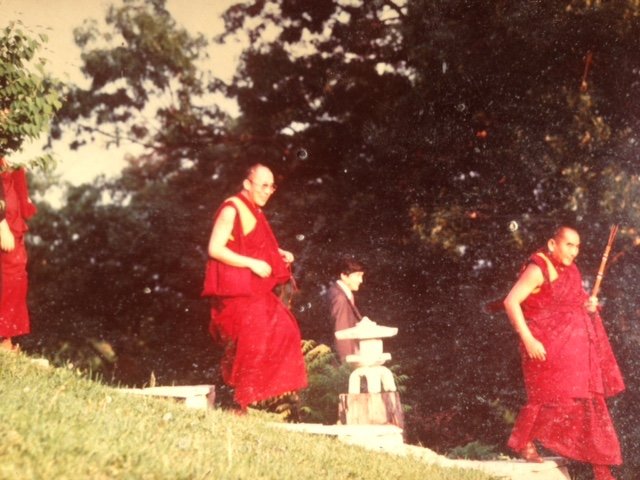All Writings
I hope whomever reads through these posts are moved to walk through the world with a wider sense of being, a more compassionate heart, and with a greater intention to recognize and work towards fostering interconnectedness with all beings. One of my favorite Buddhist texts, the Bodhicaryavatara by Shantideva has these beautiful lines that for me, sum up my intention as a human and as a chaplain:
May I be a guard for those that are protectorless,
A guide for those who journey on the road.
For those who wish to cross the water.
May I be a boat, a raft, a bridge.- Bodhicaryavatara by Shantideva (chap. 3, vs 18 Padmakara Translation)
Ten Ox Herding Pictures
This depiction of the Ten Ox-Herding Pictures, also known as The Ten Bulls, stems from the Zen tradition of Buddhism and represents the stages one goes through in taming the mind. Though of Buddhist origin, it is relevant to the journey of gaining mastery over one’s mind, and being in the world with the intent and gifts to benefit others regardless of one’s faith tradition or beliefs. I revised the text to make the series more inclusive and to express a non-denominational vocabulary.
The Dharma & Me
I began studying Buddhism at the age of 14, at the prompt of an 8th-grade English teacher. He had written in the margins of a paper I wrote “your writing rings the bell of the dharma.” My life was forever changed by the deafening bells that rang within the walls of my heart when my eyes first set sight on the word “dharma.”
Exploring the Rime Movement
My interest in Rime goes back several decades to the late 70s when I began studying Tibetan Buddhism. At that time, Tibetan teachers in the west were few and far between. A fledgling dharma student such as myself would take teachings from whoever came through, whether it be a Geluk, Nyingma, Sakya, Kagyu, or even Bon teacher. I didn’t know that much about the differences between sects, and didn’t see any conflict between the various teachings I had taken. Many years later, someone asked me what lineage I “was” and I was stumped for an answer. When I explained that I took teachings whenever and wherever I could, from whomever, the questioner said, “Oh, then you are Rime.”
The Five Dhyani Buddhas; Gifts of the Five Skandhas
All Buddha’s teachings are aimed at inner transformation. The Tibetan word for Buddhist is “nang-pa la” which can be translated as “inside dweller, or “inside traveler.” Buddhism invites us to scale the Himalayas of our inner psychological constructs. The teachings of Buddha are aimed at recognizing and transforming our wrong view of reality, which is brought about by the tendency to identify ourselves as an independently existing entity.
My First Buddhist Teacher
I’ve been lucky to have met and learned from many spiritual teachers. In 1979 I first saw His Holiness the Dalai Lama, whom I consider my root guru, and have taken teachings with him yearly ever since. Through my work with different monasteries I have been able to take teachings with many of Tibet’s greatest teachers.
This story is not about a Tibetan teacher, nor is she a Buddhist as far as I know. Still, I consider her my first Buddhist teacher, someone who taught me the essence of all the Buddha’s teachings.
The Meaning of Ignorance in the Abhidharma
Before we can discuss the role ignorance has in Buddhism in general and the Abhidharma in specific it is helpful to find a definition of ignorance that fits with its original usage as well as an understanding that is relevant to our lives. In our western world, the word ignorance is often used synonymously with naiveté, or, more bluntly, stupid. The language of Buddhism obviously did not originate in English. It is important when we are trying to grasp some basic concepts of Buddhism, to dig deeper into what the word meant and how it was used in its original languages before we can extract and transpose meaning into our own language.
On the Rag with the Monks
In a perfect world, my period would have started and stopped well before I left the United States for Nepal. I’d counted it out on my calendar before getting my ticket. But no, pigs can’t fly, beggars can’t ride and perhaps if it were a perfect world, women wouldn’t menstruate in the first place. Or, if they did, the periods would be less disruptive. As it was though, I was awakened at three in the morning by the worst cramps, just two days after arriving in Nepal. I was staying in a tiny room in a small monastic school in the mountains outside of Kathmandu.
Shentong/Rangtong: A Both/And of Tibetan Buddhism
The goal of this paper is to discuss the Rangtong and Shentong views of emptiness through the lens of Tibetan Buddhist history as well as through the lens of some of the general points of Buddhism. Through this discussion, I hope to point out that when discussed in a political/historical setting the Rangtong/Shentong perspectives take on a different, less philosophically charged focus.
My Grandson Theo Locates Himself on the Wheel of Life
My two-and-a-half-year-old grandson Theo is fascinated with the different items in my house related to Tibetan Buddhism. He loves playing with the malas, the prayer wheels, the bells, and has been identifying Buddhas in his neighborhood since he was around two.
Buddhist Comparison Chart
I made this chart for chaplaincy students and the inmates in my groups in San Quentin. I hope you find it useful. In 2021 I was blessed to have Professor Donald Lopez, Buddhist Scholar, look it over and suggest edits.
Writings By Category
-

Prison Chaplaincy
-

Animal Chaplaincy
-

Interfaith Writings
-

Buddhist Writings








